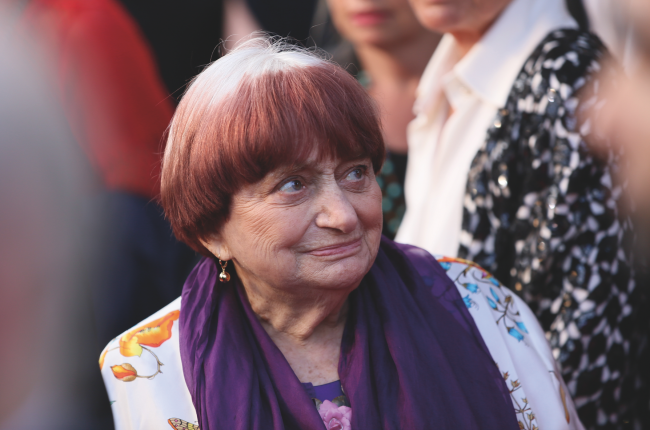Homage to Late Icon and Nouvelle Vague Pioneer, Agnès Varda

Dimitri Keramitas charts the extraordinary career of the late “Grandmother of the New Wave”, Agnès Varda
When Agnès Varda passed away aged 90 in March, France and the world lost a towering figure of cinema.
Nicknamed the “Grandmother of the New Wave”, the pioneering director was a central figure of the French Nouvelle Vague. As an artistic movement, the New Wave created a sharp rupture with what came before, both ‘classic’ French cinema and studio-dominated Hollywood, giving film the throb of contemporary life. Today’s proliferation of indie and indie-type films would be unthinkable without these New Wave precursors. Beyond film, the New Wave ushered in a fresh sense of modernity in French society. Could May ‘68 have taken place without the mental sea change wrought by a generation of young filmmakers? Probably not.
Several elements contributed to her unique sensibility. Before dedicating herself to filmmaking, the Belgian-born French réalisatrice was a successful photo-journalist. And, of course, she was a woman who gave a feminine, and feminist, spin to her work. Reclaiming the phrase “5 à 7” – traditionally a reference to the time a man spent with his mistress – in her 1961 film, Cléo de 5 à 7, she charted the fraught period in which a young woman awaits results from a crucial medical exam. Each segment of the movie represents a station of the cross in the face of her mortality.
Varda was also a political director, vitally engaged with her time. She contributed an episode to the omnibus film Loin du Vietnam (Far from Vietnam). It’s a historical artefact now, but at the time was an important project expressing the political conscience of an entire generation. She went on to make documentaries about the Black Panthers and iconic Panther leader Huey P. Newton. In 1963, she visited Cuba, where she took some 1,800 photos which she collated into an award-winning documentary, Salut les Cubains.
I first became exposed to the assertive feminist activist’s work in the 1980s, with her seminal film Sans Toit Ni Loi (Vagabond), which follows the adventures of a young – little more than a girl – vagabond. She seems nearly feral in her natural integrity and elemental relations with the world. In a period that saw the rise of directors with stylised approaches, like Jean-Jacques Beineix, Luc Besson and Leos Carax, Varda remained an outlier with her austere vision – comparable to another spiky New Waver, Jean-Luc Godard, who also re-emerged in the ‘80s.
Varda was married for 28 years to fellow filmmaker and The Umbrellas of Cherbourg director Jacques Demy, with whom she raised two children. After his death in 1990, she made two films about her husband: the feature Jacquot de Nantes (1991) and the documentary L’univers de Jacques Demy (1995). A Cannes fixture, she presented more than a dozen films at the auteur festival between 1958 and 2018.
In later years she turned to documentaries with a loose form, dealing with subjects that were themselves free and concrete. In 2000, she released Les Glaneurs et la Glaneuse, training her lens on “glaneurs” (gleaners), scavengers who pick up and gather objects out of necessity or for artistic ends. The title’s “glaneuse” referred to herself as a director in search of resonant subjects in the world.
In 2017, at the age of 88, she joined forces – and went on the road – with street artist JR, creating remarkable and moving portraits of the people they met on their travels. The resulting (and her final) documentary, Faces Places, won the L’Oeil d’or award in Cannes and was nominated for an Academy Award. Varda was also the first female director to win an Academy Honorary Award, in addition to many other accolades, including the Légion d’Honneur. A true trailblazer.
From France Today magazine
Share to: Facebook Twitter LinkedIn Email
Leave a reply
Your email address will not be published. Required fields are marked *



